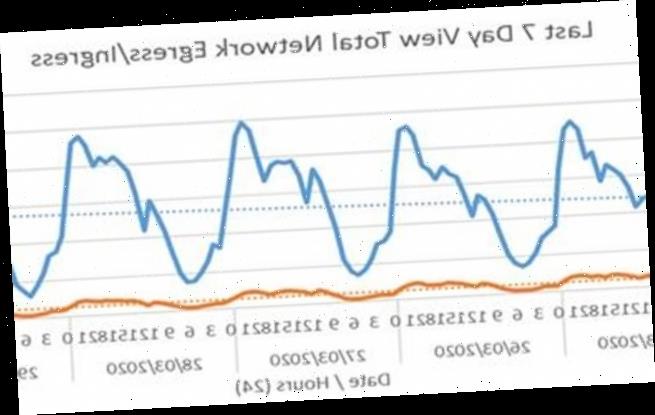Working 9 to 5! Internet traffic in the UK has almost DOUBLED in three weeks thanks to people working from home and youngsters not going to school during coronavirus lockdown
- On March 30 the consumption of data in the UK on Openreach was 51Petabytes
- Exactly three weeks prior this figure was 27Pb and spiked following lockdown
- Openreach claims it has enough capacity to cope with the increasing demand
- Coronavirus symptoms: what are they and should you see a doctor?
British daytime internet usage has skyrocketed as adults and children alike are stuck in the house during the hours of 9am to 5pm.
Data from Openreach, which owns and operates most of the UK’s phone broadband lines, reveals daytime data consumption has almost doubled in three weeks.
On March 9, one week before Boris Johnson gave his first daily coronavirus press conference urging people to work from home wherever possible, the total amount of data used between 9am and 5pm was 27 petabytes.
On Monday March 30, this figure reached 51Pb, almost double the previous figure. One petabyte is the same as one million gigabytes.
Scroll down for video
On Monday March 30 Openreach saw 51Pb of utilisation throughout the daytime working hours of 9am and 5pm. This figure is up 89 per cent from three weeks prior. Pictured, the blue line shows data consumption on Openreach network in the UK for last week
INTERNET USAGE HAS INCREASED IN THE UK
Lebara Mobile told MailOnline that over its network it has actually seen a decline in its mobile internet usage.
TalkTalk, which offers all its customers unlimited data usage, says its daytime network traffic was around 20 per cent higher on Tuesday.
Early indications indicate this was replicated yesterday.
A Vodafone spokesperson told MailOnline internet traffic over both its broadband and mobile services have increased around 30 per cent.
This is driven primarily by users flooding to news sites and video streaming services for video calls.
Openreach has revealed in three weeks it has seen an almost 100 per cent increase in its daytime data consumption in Britain.
An Openreach spokesperson told MailOnline: ‘On Monday, we saw 51Pb (petabytes) of data through the network between 9am – 5pm, compared to 46Pb last Monday.
‘The peak time during the day continues to be between 2pm and 5pm, while the evening peak is between 8pm and 11pm.
‘Overall, the network is coping very well as we have expected.’
Data from the Openreach network revealed an increase every week since March 9, before social distancing measures were implemented
On the March 16, when Mr Johnson gave his first speech mentioning the need for people to work from home, this figure had already climbed to 31Pb.
A week later, the same day Boris announced effective national lockdown, this jumped significantly to 46Pb.
On the first working day of this week, the figure climbed again, this time to 51Pb.
From March 9 to March 30 this is a like-for-like increase of 89 per cent.
The continued rise in internet consumption is likely due to the increasing use of video calls for work and children being off school streaming TV shows and gaming.
The UK release of Disney+ in the UK on Tuesday, March 24, may also have accounted for the increase in data demand.
But a greater use of e-learning resources and video calls with tutors as a surrogate for classroom-based learning may also be a contributor.
Openreach said that the peak demand during working hours is between 2pm and 5pm as people turn to online entertainment to while away the long afternoon hours.
However, the biggest daily demand is still in the evening between 6 and 9pm as more people turn to their data intensive hobbies such as streaming or gaming.
Vodafone has recently revealed it has seen a surge in demand following the coronavirus lockdown.
The Europe-wide telecomms giant says its networks are coping with the demand but is seeing an increase in usage of both internet and voice calls.
A Vodafone spokesperson recently told MailOnline: ‘We have seen internet traffic across both fixed and mobile increase by around 30 per cent to news sites and video streaming services.’
They added: ‘We are now seeing traffic starts building up earlier.
‘We have been adding extra capacity to our network and engineers are putting in different hardware and additional lines to cope with any increased demand.’
In some European markets, demand for internet has risen by up to 50 per cent.
In a statement, Vodafone said: ‘COVID-19 is placing a greater demand on our networks and in some European markets we have seen data and voice traffic increase by up to 50 per cent for short periods.
‘Our engineers have increased network capacity by up to 50 per cent in our markets in recent weeks and continue to make further upgrades across our networks to make sure they are resilient and can absorb new usage patterns.’
Source: Read Full Article

